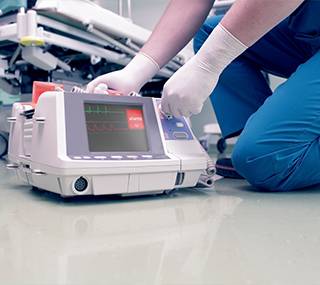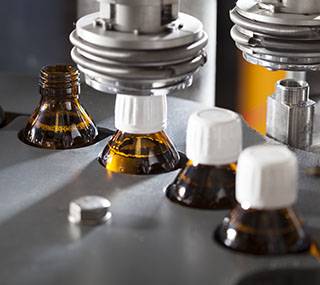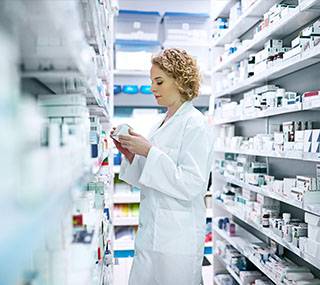Inspecting products and practices
In its health authority capacity, ANSM, through its inspection activity, monitors the quality of practices among operators (manufacturers, operators, importers, distributors, trial sponsors, investigators, etc.), as well as the quality and safety of healthcare products, including starting materials.
As such, ANSM:
- helps to define enforceable regulatory frameworks (especially good practices and applicable standards);
- manages the corresponding sites (authorisations, accreditations, declarations, sanctions, etc.);
- ensures that the enforceable regulatory provisions are implemented, via on-site inspections in the context of an annual or random inspection programme.
Managing sites
For medicines and starting materials
To open a pharmaceutical site, operators conducting activities related to the marketing of medicines in France or Europe are subject to ANSM’s prior authorisation scheme.Similarly, sites that manufacture, import, and distribute active substances are subject to ANSM’s authorisation scheme. Sites that perform these same activities for excipients are subject to a report-based scheme.
For labile blood products and other biological products
Labile blood products are obtained from blood donations. They include cell products and plasmas and are intended to be transfused to patients. Sites carrying out transfusion activities are accredited to do so via a decision by ANSM’s Director General.All activities pertaining to the preparation, storage, distribution, sale/transfer, import or export of tissues, their derivatives, cells and cell therapy preparations, of human origin, used for therapeutic purposes are subject to prior authorisation by ANSM’s Director General.
In order to carry out any activity pertaining to the preparation, storage, distribution, or sale/transfer of innovative therapy medicines prepared on a one-off basis (including experimental medicines), prior authorisation from ANSM’s Director General is also required.
For breast milk banks, ANSM oversees the technical appraisal of operating authorisation applications, which are issued by regional health agencies (ARS).
Similarly, the storage, use, inter-site transfer, import and export of certain agents responsible for infectious diseases, pathogenic microorganisms and toxins (MOT) require authorisation from ANSM. Authorisations are granted once the biological safety and security risks have been assessed. ANSM also monitors licensed representatives who are authorised to store and handle MOTs, and collects administrative reports and notifications of any events that could potentially result in the spread of MOTs.
For medical devices (MDs) and in vitro diagnostic medical devices (IVDMDs)
To open their site, operators releasing MDs or IVDMDs to the French or European market do not require prior authorisation.However, ANSM oversees device post-marketing surveillance, particularly through inspections in order to ensure compliance with the requisite essential requirements and the conformity of the devices on the market.
Inspecting sites
Inspections make it possible to establish a degree of confidence in the quality of the practices of the players involved (manufacturers, operators, importers, distributors, trial sponsors, investigators, etc.), who remain primarily responsible for their practices, the quality and safety of the health products and the safety of patients included in trials and, more generally, the use of health products in human health.The purpose of these inspections is to:
- assess the compliance of the practices of the players involved (manufacturers, healthcare institutions, clinicians, etc.) with the best practices or standards in force for an activity, product, or clinical or non-clinical trials, with a view to ensuring that they are capable of producing quality data and/or health products safely;
- carry out technical investigations in response to a report of a quality defect, incident, or especially a significant event (e.g. whistleblower intervention);
- gather the necessary information for subsequent administrative proceedings:
- preparation of a technical opinion within the scope of the appraisal of applications for site authorisation or accreditation or marketing authorisation for medicines, tissues, and cell therapy preparations ;
- issuance, renewal or withdrawal of a certificate (good manufacturing, distribution practice, etc.).
International inspection coordination
With a view to addressing the challenges associated with the globalisation of the medicine production, manufacturing and distribution chain, inspection activities are organised and harmonised on European and international levels. The harmonisation of practices, sharing of information of common interest and pooling of inspection resources have been organised by the competent authorities.
In this way, inspections are conducted worldwide according to the same high standards regardless of the manufacturing location, in the aim of improving access to safe and effective high-quality medicines. Inspections conducted by a Member State of the European Union are based on the principle of mutual recognition of inspections conducted on national territory and European Union-third countries. Mutual recognition agreements have also been signed with different countries allowing the recognition of inspections conducted on national territory.
In this way, inspections are conducted worldwide according to the same high standards regardless of the manufacturing location, in the aim of improving access to safe and effective high-quality medicines. Inspections conducted by a Member State of the European Union are based on the principle of mutual recognition of inspections conducted on national territory and European Union-third countries. Mutual recognition agreements have also been signed with different countries allowing the recognition of inspections conducted on national territory.
Inspection follow-up actions
Inspections may lead to the following administrative follow-up actions :- Injunctions
- Health policy decisions
- Suspension of the activity at the source of the risk (suspension, withdrawal of authorisation or accreditation, etc.)
- Financial sanction
The inspection may trigger criminal and disciplinary penalties.
Inspections are carried out in the context of an annual programme prepared based on risk mapping, particularly according to the nature of the activities carried out by the operators, according to previous inspection history, etc. Inspections can also be carried out following an internal referral or external request, particularly following a safety report received by ANSM. The operator may be notified of the inspections, or the inspections may be conducted on a spot-check basis. The Inspection Division allocates 10% of its inspection programme to inspections in third countries.
Inspections are carried out in the context of an annual programme prepared based on risk mapping, particularly according to the nature of the activities carried out by the operators, according to previous inspection history, etc. Inspections can also be carried out following an internal referral or external request, particularly following a safety report received by ANSM. The operator may be notified of the inspections, or the inspections may be conducted on a spot-check basis. The Inspection Division allocates 10% of its inspection programme to inspections in third countries.
Inspection report
An inspection is always finalised with an inspection report stating the deviations observed from the references. The inspection report is drafted using a jointly undertaken process involving sending a preliminary report to the operator. The operator may then disclose its responses, preventive or corrective actions to resolve the deviations observed. Based on these responses, the final report is drafted and is used to pronounce site compliance or take appropriate decisions in the event of non-compliance.Different inspections
Inspection of non-clinical trials
Operators concerned
Research facilities responsible for preclinical trials on:
Research facilities responsible for preclinical trials on:
- medicines for human use,
- medical devices (inspections on referral or after voluntary request from the trial facilities).
- French Public Health Code
- Good Laboratory Practice (GLP)
Inspection of clinical trials
Operators concerned
- sites where clinical trials are carried out
- sponsors of these studies
- subcontractors (CROs)
- French Public Health Code
- Good Clinical Practice
Inspection of pharmacovigilance activities
Operators concerned
- pharmaceutical sites
- service providers
- French Public Health Code
- Good Pharmacovigilance Practice
Inspection of medical device vigilance activities
Operators concerned
- manufacturers
- agents
- importers
- distributors
- French Public Health Code
Inspection of breast milk banks
Operators concerned
- breast milk banks
- French Public Health Code
- Good Breast Milk Bank Practice
Inspection of microorganism and toxin (MOT) sites and authorisation holders
Operators concerned
- MOT authorisation holders
- sites carrying out activities on MOTs
- French Public Health Code
- Best practices aimed at ensuring biological safety and security
Inspection of medicinal products and their starting materials
Operators concerned
- pharmaceutical sites
- operators that manufacture, import, and distribute active substances or excipients
- French Public Health Code
- Good Manufacturing Practice (GMP)
- Good wholesale Distribution Practice (GDP)
- Good Distribution Practice of active substances for human use
- Good Pharmacovigilance Practice
- Pharmacopoeia
Inspection of blood products
Operators concerned
- blood transfusion centers
- French Public Health Code
- Good Transfusion Practice
Inspection of tissues and cells of human origin
Operators concerned
- cell therapy units
- tissue banks
- French Public Health Code
- Good Tissue & Cell Practice
Inspection of innovative therapy medicines (MTI) and innovative therapy medicines prepared on a one-off basis (MTI PP)
Operators concerned
- pharmaceutical sites
- operators authorised to manufacture MTI PP medicines
- French Public Health Code
- Good Manufacturing Practice specific to innovative therapy medicines
Inspection of medical devices and in vitro diagnostic medical devices
Operators concerned
- notified bodies
- manufacturers
- agents
- distributors
- French Public Health Code
- Essential requirements





